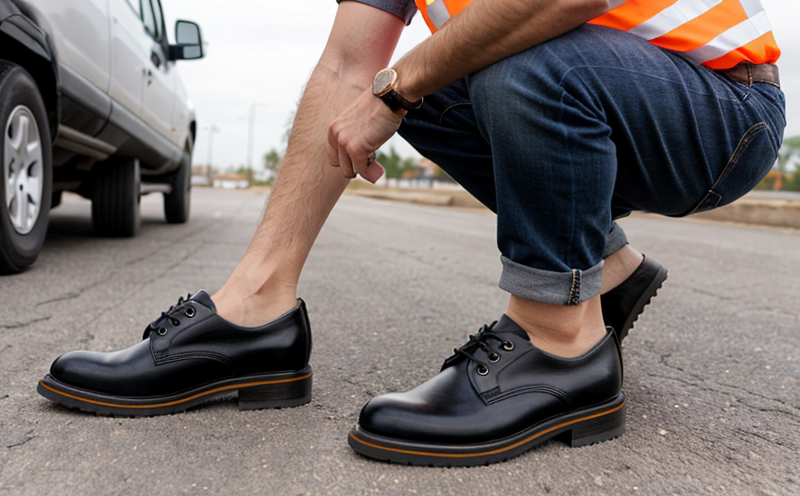Footwear inspection
Footwear inspection is a critical process within the footwear manufacturing and supply chain sectors. It ensures that products meet quality standards set by both internal specifications and external regulatory requirements. This service involves comprehensive examination of various aspects including materials, construction, fit, durability, comfort, and overall aesthetics. By leveraging advanced testing equipment and methodologies, our laboratory provides detailed reports that help manufacturers identify potential issues early in the production cycle.
The importance of footwear inspection cannot be overstated; it plays a pivotal role in maintaining brand reputation, enhancing customer satisfaction, and ensuring product safety. For instance, improper material selection can lead to premature wear or injury, while inadequate construction might result in poor fit leading to discomfort during use. These factors not only impact user experience but also affect the longevity of the product.
Our team uses state-of-the-art technology such as scanning electron microscopes (SEM), infrared spectrometers, and mechanical testers to assess different components like leather, textiles, foams, and plastics used in footwear. We follow international standards like ISO 20347 for footwear terminology and EN 1995-2:2016 for the determination of hardness of leather and related materials by indentation. Our rigorous inspection process ensures consistency across all batches produced by our clients.
In addition to physical attributes, we also evaluate functional properties such as water resistance, breathability, slip resistance, and flexibility under various conditions. This holistic approach guarantees that every pair of shoes leaving the factory meets or exceeds expectations set forth by industry best practices.
By investing in thorough inspection processes early on, manufacturers can prevent costly recalls later down the line. Moreover, this proactive measure helps maintain brand integrity which is paramount given today's highly competitive market environment where consumers are increasingly demanding transparency about product quality and safety. Thus, regular inspections serve multiple purposes – they safeguard against legal risks associated with non-compliance; they foster trust between producers and end-users; and ultimately contribute towards sustainable business growth.
- Comprehensive assessment: Evaluation of materials, construction, fit, durability, comfort, and aesthetics.
- Standard compliance: Adherence to international standards such as ISO 20347 and EN 1995-2:2016.
- Advanced technology: Use of SEMs, infrared spectrometers, mechanical testers for precise measurements.
- Functional properties: Assessment of water resistance, breathability, slip resistance, and flexibility.
Why It Matters
The significance of footwear inspection extends beyond mere quality assurance; it reflects broader strategic considerations pertinent to the footwear industry. Firstly, consistent adherence to high standards is essential for protecting brand reputation and fostering long-term customer loyalty. Unreliable products not only harm immediate sales but also damage future opportunities by tarnishing the image associated with a particular brand name.
Secondly, ensuring compliance with relevant regulations helps mitigate potential legal challenges. Non-compliance can result in hefty fines or even closure of manufacturing units depending upon local laws and international agreements. Therefore, proactive measures like regular inspections are not just advisable but necessary for any responsible company operating within this sector.
Thirdly, efficient inspection processes contribute positively towards sustainability initiatives. By catching defects early during production, companies can reduce waste generated at later stages when rework or complete replacement becomes unavoidable. Additionally, energy-efficient practices employed during inspections themselves play a part in reducing carbon footprints associated with manufacturing operations.
Lastly, feedback derived from inspection results allows for continuous improvement within R&D departments. Understanding areas requiring enhancement provides valuable insights which can be incorporated into future designs and prototypes thus driving innovation forward continuously.
Scope and Methodology
Footwear inspection encompasses a wide range of activities aimed at evaluating various aspects of footwear products. The scope typically includes material analysis, construction verification, dimensional checks, color consistency testing, and functional property assessments among others.
In terms of methodology, our approach involves several key steps:
- Initial Review: Examination of documentation provided by clients regarding the product specifications and desired outcomes from inspection services.
- Sample Preparation: Careful selection and preparation of samples ensuring they represent typical production lots accurately.
- Material Analysis: Utilizing sophisticated tools like SEMs to examine surface textures, grain structures, and chemical compositions of materials employed in footwear construction.
- Construction Verification: Detailed inspection of sewing patterns, stitching quality, assembly techniques used during manufacturing processes.
- Dimensional Checks: Measurement of critical dimensions such as length, width, circumference etc., comparing them against approved specifications.
- Color Consistency Testing: Verification that all components maintain uniform color across different parts of the shoe unit.
- Functional Property Assessments: Evaluation of performance characteristics including water resistance, breathability, slip resistance, and flexibility under varying conditions.
Competitive Advantage and Market Impact
- Differentiation: By offering comprehensive inspections based on current market trends and evolving standards, we enable our clients to stay ahead of competitors.
- Customer Satisfaction: Ensuring that every pair of shoes meets stringent quality benchmarks contributes significantly towards enhancing customer satisfaction levels.
- Brand Protection: Regular inspections serve as a safeguard against any deviations from agreed-upon specifications thereby protecting brand reputation.
- Regulatory Compliance: Our thorough inspection processes ensure full compliance with all applicable national and international regulations.
- Sustainability: Identifying defects early helps minimize waste throughout the supply chain, contributing to more sustainable practices.





